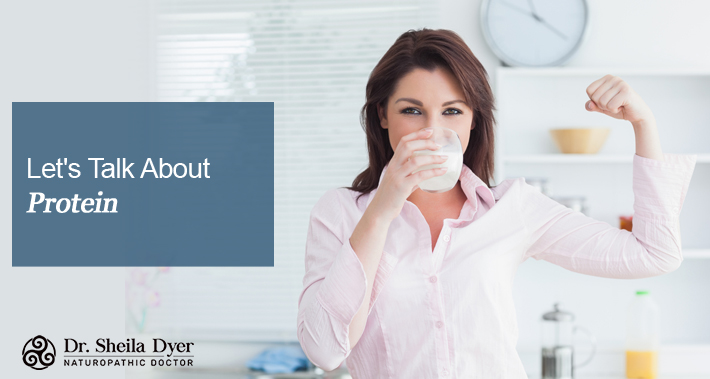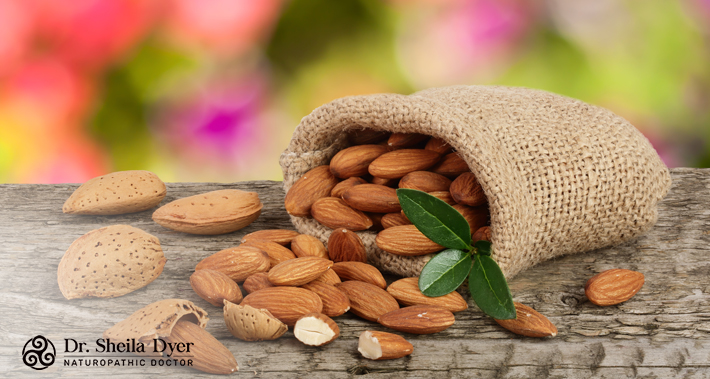There are so many different nutrients your body needs to run smoothly.
But broadly speaking, there are two categories – micronutrients and macronutrients.
Micronutrients include vitamins and minerals.
Vitamin C, iron, magnesium, that sort of thing.
But there are also macronutrients.
Those include fat, carbohydrates, and of course, protein.
Today we’ll focus on protein, what it does for your body, and what can happen if you get too much – or not enough – of it.
As a nutritional counselling naturopathic doctor I want to help you understand the importance of this vital macronutrient.
Read on as well as consider watching my video to find out more about protein.
What Is Protein?
Protein, along with fat and carbohydrates, is one of the three main macronutrients your body needs in order to function.
Macronutrients give your body energy, and protein in particular contains four calories of energy per gram.
Protein is found just about everywhere in your body, including skin, bones, muscle and organs.
It plays roles in a large number of your bodily functions.
These include cell growth and repair, hormone production, and immune system health.
What Are 5 Benefits Of Protein?
Because protein shows up just about everywhere in your body, it plays a big role in your health.
Here are five reasons to make sure you’re getting enough of it in your diet:
1. Your Body Makes Hormones With It
Your body makes different hormones using different substances.
Estrogen and testosterone, for example, are both steroid hormones.
They’re made mostly from cholesterol.
Protein and peptide hormones, on the other hand, are made from amino acids – molecules that combine to form proteins.
The protein in your diet supplies these amino acids, and from there your body uses them to produce insulin, glucagon, human growth hormone, and a number of others.
There’s also a third category of hormones – amines.
These are also made from amino acids, but specifically only tryptophan or tyrosine.
Those include epinephrine and norepinephrine, produced by your adrenal glands, and thyroxine (t4), produced by your thyroid.
However, most hormones are protein and peptide hormones.
2. Your Bodily Tissue Grows Using It
Your body is constantly breaking down and repairing your tissues.
As it does, your cells renew themselves, and they need protein to do it.
Normally, the amount of protein you break down is the same as the amount you need for your body to build and repair tissues.
If you’re ill, pregnant, or breastfeeding, however, your body will break down more protein than it’s able to synthesize.
During these times, getting enough protein in your diet is particularly important.
3. It Takes Part In Biochemical Reactions
A number of your bodily functions rely on enzymes to occur.
Enzymes are a type of protein.
They can combine with other molecules inside the cells of your body, which plays an important role in your metabolism.
They can also operate outside your cells.
For example, digestive enzymes help your body break down and digest sugar.
They also play a role in producing energy for your body, operating your muscles, and blood clotting.
Naturally, this is all important stuff.
4. It Keeps Your Body’s Fluid Levels Balanced
It’s important for your body to maintain a balance between the fluid in, and around, your cells.
The proteins albumin and globulin play an important role in that.
These two proteins retain and attract water, which helps maintain this balance.
If there is too much fluid build up in the spaces outside of your cells, it can lead to swelling, especially in your stomach.
One risk of not getting enough protein is a condition called kwashiorkor.
Kwashiorkor is a severe form of protein deficiency which occurs when you are not getting enough protein but are otherwise eating sufficient calories.
It’s characterized by edema and an enlarged liver, but this disorder is rare in Canada.
5. Your Cells’ Structure Is Made From It
Have you ever looked at all the skincare products on the shelf at the store?
You’ll see things like elastin, keratin, and collagen over and over.
Did you know those are actually proteins?
They form the framework of your cells, and provide them with structure.
Elastin, in particular, is very flexible.
It’s what allows your lungs and arteries to keep their shape when they stretch and contract.
Keratin helps form the structure of hair, nails, and skin.
And collagen?
There’s more of that than any other type of protein in your body.
Collagen provides structure for your skin, bones, ligaments, and tendons.
6. What Else Does Protein Do?
A lot more than what we listed above, that’s for sure.
Here are some of the other ways protein helps your body run.
- Maintains the pH balance of your blood and stomach acid
- Promotes bone health
- Helps your body burn fat
- Gives your body energy
- Increases your metabolism
- Helps curb late night snacking
- Helps manage your appetite and reduces hunger
- Helps with the formation of immunoglobulins, an important part of your immune system
- Lowers your blood pressure
- Improves your strength and muscle mass
- Helps prevent age related muscle decay
- Carries and stores nutrients through your bloodstream
What Are The Best Sources Of Protein?
Although protein is often associated with animal and meat products, there are also many great vegetarian sources of it as well.
Here are some great high protein options, including both animal based and vegetarian options.
- Greek yogurt
- Chicken breast
- Fish
- Eggs
- Cheese
- Soy beans
- Milk
- Quinoa
- Tofu
- Almonds
- Lentils
- Lean beef
- Cottage cheese
- Pumpkin seeds
- Turkey breast
- Peanuts and peanut butter
- Shellfish
What Happens If You’re Low In Protein?
Protein is one of the most important nutrients your body needs.
As you have read, it’s responsible for a large number of functions in your body.
Symptoms of protein deficiency include:
- Increased risk of broken bones
- Swollen, puffy skin, or edema
- Stunted growth, particularly in children
- Hair thinning
- Brittle nails
- More severe infections
- Fat accumulation in liver cells
- Increased appetite
- Decreased muscle mass
Can Too Much Protein Be Bad For You?
As important as protein is, it’s possible to get too much of a good thing.
Protein poisoning occurs when you get too much protein, especially if it’s not balanced by fat and carbohydrates.
If protein makes up more than thirty five percent of your diet, it can be considered excessive.
Increased protein levels can lead to elevated levels of amino acids, ammonia, and urea in the blood, which can be fatal.
Symptoms of protein poisoning include:
- Mood swings
- Food cravings
- Hunger
- Tiredness and weakness
- Nausea
- Hypotension (low blood pressure)
- Headache
- Diarrhea
- Decreased heart rate
Book Your Appointment With Dr. Shelia Dyer, ND, Today
Are you worried about getting enough nutrients?
Maybe you follow a vegetarian or vegan diet, and want to ensure you’re getting adequate protein.
I’m Dr. Sheila Dyer, ND, a naturopathic doctor in Toronto and I can help.
I’ll review your current health status, any allergies or other dietary considerations you may have.
Then, I’ll help you create a nutrition plan to help you get everything your body needs to perform at its peak.
Book your appointment with me, Dr. Sheila Dyer, ND, today.
If you have questions about naturopathic medicine, or would like to start with your first consultation, contact me, and let’s book an appointment.
Dr. Sheila Dyer, ND1080 Dovercourt Rd,
Toronto, ON M6H 2X8
(416) 554-5135
► https://g.page/DrSheilaDyerNd
Dr. Sheila Dyer is a Naturopathic Doctor and a practicing registered nurse offering holistic healthcare with a scientific focus

